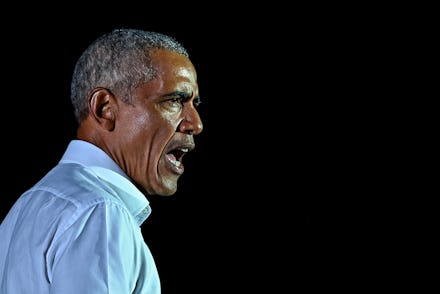Donald Trump is nothing like hip-hop, despite what Obama says

In a sprawling new interview with The Atlantic, former President Barack Obama offers his best explanation for how our politics corroded to their current levels of hopelessness. The Q+A, led by Atlantic editor-in-chief Jeffrey Goldberg, is centered around Obama's upcoming memoir, Promised Land. The former president provides the kind of sweeping perspective that one might expect from the nation's last coherent commander-in-chief. He also manages to unwittingly make the case against the very political order he represents.
It comes in an unforced error on Obama's part. Answering a question about Trump's base, the former president makes the cogent point that one could have perhaps seen Trumpism coming. After all, there are any number of reasons to be aggrieved in a nation as unequal as the United States. Obama, however, is surprised that a figure as ostentatious as Trump could ascend the ranks of power in America. He would have expected a more salt-of-the-earth figure. A Clint Eastwood type.
I guess I’m also surprised by, and this is not an original thought on my part—but I think about the classic male hero in American culture when you and I were growing up: the John Waynes, the Gary Coopers, the Jimmy Stewarts, the Clint Eastwoods, for that matter. There was a code. This is something I always emphasize. I may be African American but I’m African and American. This is part of me. The code of masculinity that I grew up with that harkens back to the ’30s and ’40s and before that—there’s a notion that a man is true to his word, that he takes responsibility, that he doesn’t complain, that he isn’t a bully; in fact he defends the vulnerable against bullies. And so even if you are someone who is annoyed by wokeness and political correctness and wants men to be men again and is tired about everyone complaining about the patriarchy, I thought that the model wouldn’t be Richie Rich—the complaining, lying, doesn’t-take-responsibility-for-anything type of figure.
Already, there's a rigidity in his understanding of the American public. For Obama, the country needs to fit into identifiable, and predictable, buckets. Instead of considering the limitations of such a framework — one that has proven, with increasing support across demographics for conservatism, to be insufficient — Obama doubles down, explaining Trump as emblematic of pop cultural shifts that he "missed."
Obama: Yes, and it’s this indication of parts of popular culture that I’ve missed. It’s interesting—people are writing about the fact that Trump increased his support among Black men [in the 2020 presidential election], and the occasional rapper who supported Trump. I have to remind myself that if you listen to rap music, it’s all about the bling, the women, the money. A lot of rap videos are using the same measures of what it means to be successful as Donald Trump is. Everything is gold-plated. That insinuates itself and seeps into the culture.
There's an uncomfortable tint of respectability politics present in Obama's comparison between Trump and hip-hop. The former president's comfort with flattening the complexity of a genre so often co-opted by his liberal cohorts when they need to conjure their own vision of populism reveals a latent contempt that continues to widen the gap between Americans and the politicians who serve them.
"Bling" has not been a word in the pop cultural lexicon since the Clinton administration. Even then, there's a clear difference between the hardened celebrations of triumph present in even the most clichéd catalog of hip-hop records and Donald Trump's blasé decadence.
Not to mention the fact that the most popular rappers during Obama's presidency spent the decade collapsing boundaries of identity and genre. It was during his tenure that the internet-bred ethos of groups like Odd Future helped reshape a generations' taste. Kendrick Lamar's opus, good kid, m.A.A.d city, came out during Obama's first term. Two of the most prolific hip-hop acts of Trump's term have been Cardi B and Megan Thee Stallion, women whose overt politics fall more in line with left-leaning politicians like Bernie Sanders than with whatever icons of wealth Trump represents.
The suggestion that audiences make no distinction between hubris in hip-hop and hubris on the part of a man like Donald Trump is a profound statement on how unintelligent Obama believes the American public to be. It's also indicative of a broader refusal by mainstream politicians to engage with material reality.
For his part, Obama's cool introspection about his presidency is in fact refreshing. For the years leading up to Trump, and during much of his presidency, it was rare to hear him acknowledge the white supremacist elephant in the room, as he does more candidly throughout this interview. But with that candor comes a look into a profoundly lacking perspective. If Obama had really been paying attention to hip-hop, he would have seen Trump coming for decidedly different reasons.